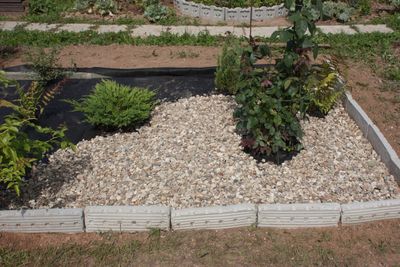Choosing Mulch for Windy Areas
Mulch comes in many different varieties. The basic division is between organic and inorganic mulches. Organic mulch, like compost, decomposes into and improves the soil. Inorganic mulch, like pebbles or rock, doesn’t ever decompose. Ideally, a mulch has many good qualities. It’s great to use a mulch that won’t compact easily, allows water and air to enter the soil, won’t catch on fire, and decomposes slowly. The dream mulch is attractive, prevents weeds from growing, and does not blow away. You must prioritize, however, since no mulches can do it all. When you are selecting a mulch for windy areas, wind protection tops the list of the qualities you seek in a mulch. What type of mulch won’t blow away?
Inorganic Mulching in Windy Spots
When you live in a windy area, it is likely you need a wind proof mulch, a mulch that doesn’t blow away. Mulching in windy spots can help protect the soil from being blown away, while providing some of the other benefits of mulch. Heavier mulches are preferred when mulching in windy spots. Mulch like straw or sawdust may disappear in minutes during a strong blow, leaving the ground beneath it unprotected. Pebbles or rock make good mulch for wind prone gardens since they are heavy. They also allow water and air to pass into and out of the soil. On the downside, they are inorganic and will not decompose into the soil.
Organic Wind Proof Mulch
Are there any types of organic wind proof mulch? Large wood chip mulch is a possibility, since chips are heavier than many types of mulch. Ground pine bark makes a good heavy mulch that is even harder for the wind to dislodge. You can support the wind proof mulch by planting wind barriers on the side of your garden where the prevailing wind blows. Fast growing conifers can really make a dent in the impact of the gusts. Alternatively, erect a wall or a fence as a wind block. Another option is to water down whatever mulch you use when windy weather is expected.
